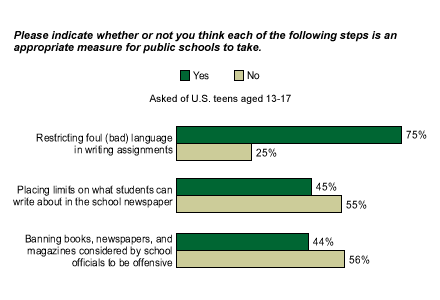Students don't, as the Supreme Court wrote in its 1969 Tinker v. Des Moines decision, "shed their constitutional rights to freedom of speech or expression at the schoolhouse gate." But the rules definitely change once students enter them. School officials can, to a certain degree, censor what students say, write, or read -- and teens don't necessarily have a huge problem with that.
Most of the 13- to 17-year-old respondents in a recent Gallup Youth Survey* said it's appropriate for public schools to restrict "bad" language in writing assignments. But fewer said it's appropriate for schools to limit what students can write about in student newspapers, or to ban books, newspapers, and magazines that school officials consider offensive.

"I think students realize since they are little that profanity is disfavored," says David L. Hudson Jr., research attorney for the First Amendment Center at Vanderbilt University. "The law does provide school officials in the Fraser decision [the ability] to prohibit profanity. I think students draw the line when it comes to censoring ideas and viewpoints, particularly reading and the school newspaper, which more students identify as student-initiated speech, rather than school-sponsored expression."
Out With the Bad?
There is, as Hudson mentions, legal precedent for public schools to prohibit the use of vulgar or profane terms -- if the expression interferes with the school's work or encroaches on other students' rights. In the Bethel v. Fraser decision in 1986, late Supreme Court Chief Justice Warren Burger wrote: "It is a highly appropriate function of public school education to prohibit the use of vulgar and offensive terms in public discourse."
Sixteen-year-old Jacob, a Youth Survey respondent from Minnesota, was among the 75% of teens who concur with the Supreme Court, saying schools should restrict foul language in writing assignments. "Teachers should put a limit on that and how far you can take it," Jacob says.
"I don't really think it's wrong -- there's an extent to where it becomes wrong," says Kimberley, a 17-year-old respondent from Washington. "They [schools] have the ability to limit it, but not just because it's a bad word, but maybe how it is used."
Student Newspapers
In 1988, the Supreme Court ruled in Hazelwood v. Kuhlmeier that school officials have the right to control school-sponsored student publications that are not public forums of student expression. When school officials can show their censorship is "reasonably related to legitimate pedagogical concerns," censorship is allowed. So far this year, there have been at least a handful of reported skirmishes between school officials and high school newspaper staff.
"If the stories are really inappropriate, then I think they should do something about it," says Jacob, who was among the 45% of teen respondents who said schools should limit what students can write in school papers.
Kimberley sides with the 55% of teens who think school officials shouldn't limit student journalists. "In colleges, they don't quite restrict it so much, it's a little bit more open," she says. "It's kind of like secluding us from real life."
Book Banning
The American Library Association reported 6,364 challenges -- or formal complaints filed with a library or school requesting materials be removed because of content or appropriateness -- from 1990 to 2000. Seventy-one percent of these challenges, according to the ALA, were to materials in schools or school libraries. Parents brought 60% of the challenges, and school administrators brought 9%.
Fifty-six percent of teen respondents said it is not appropriate for school officials to ban books, newspapers, or magazines they deem offensive, while a substantial minority, 44%, said it is OK for schools to do this.
Who Favors Censorship?
Teen respondents who plan to vote Republican when they are old enough are substantially more likely than teens who plan to vote Democratic to say it's appropriate for schools to restrict content in students' work, limit school newspaper content, and ban materials. These differences surprised Hudson, who says that in the real world, censorship knows no political party. "Censorship comes from the right and left and every other direction." But Hudson wasn't surprised that teens between ages of 13 and 15 are somewhat more supportive of school control than are older teens (16- and 17-year-olds), because students gain more independence as they grow older.
Bottom Line
Hudson doesn't think many students have a great understanding of their rights or that schools generally do a good job of teaching the Constitution. Post-Columbine, he says, the trend has been toward more censorship in schools, and he sees this as a negative for students. "How can students appreciate the Bill of Rights if they are not allowed to experience their protections firsthand?"
*These results are based on mail and Web surveys with a randomly selected national sample of 549 teenagers in the Gallup Poll Panel of households, aged 13 to 17, conducted April 15 to May 22, 2005. For results based on this sample, one can say with 95% confidence that the maximum error attributable to sampling and other random effects is ±5 percentage points. In addition to sampling error, question wording and practical difficulties in conducting surveys can introduce error or bias into the findings of public opinion polls.